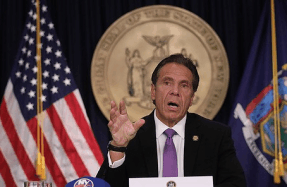Mayor Gimme

Mayor Bill de Blasio ratcheted up his progressive rhetoric last week during his State of the City address. “There’s plenty of money in the world,” de Blasio said. “There’s plenty of money in the city—it’s just in the wrong hands.” The mayor sounded as if he were channeling his Sandinista heroes of the early 1980s. Pressed by CNN’s Jake Tapper about what he meant, de Blasio reverted to a favorite history lesson about how everything went wrong in the election of 1980. “This has been an agenda from Reagan’s administration, right on through to Trump’s,” he explained, “to take money from working people and give it to the one percent.”
It’s indisputable that New York City has enormous income inequality; the top 1 percent of New Yorkers earned 40.5 percent of all the city’s income in 2014. However, that same group paid 47 percent of all the local income taxes, while one-third of the city’s filers—mostly poor residents—paid no tax. The same dynamic occurs at the state and federal levels. Those who earn the most pay disproportionately more in taxes, largely to fund wealth-transfer programs that move money down the economic ladder to the needy.
Over the course of a political career that has included five primary elections, five general elections, and a runoff election, de Blasio has raised tens of millions of dollars in campaign contributions, much of it from the wealthy. Among the billionaires from whom de Blasio accepted money for his 2017 mayoral reelection campaign, which he was assured of winning, are media mogul Barry Diller and his wife, fashion designer Diane von Furstenberg. With the help of city and state funding, Diller is erecting a park in the middle of the Hudson River. The mayor also accepted maximal campaign money from billionaire movie director Steven Spielberg, as well as from the director’s family trust, and from Jeffrey Katzenberg and his wife, and their family trust. Philanthropist Abigail Disney, Walt Disney’s niece, also contributed.
Despite his self-described “socialistic impulse,” de Blasio has been willing to take maximum donations from real estate magnates such as Joseph Chetrit, Douglas Durst, and Yeheskel Elias, even as he remains a constant critic of the city’s real estate industry. He interrupted his speech to sign an executive order authorizing the creation of a city office that would seize the property of “bad landlords.” Previously, he has expressed his “druthers” to let the city “determine every single plot of land, how development would proceed. And there would be very stringent requirements around income levels and rents. That’s a world I’d love to see.”
Scrap-metal queen Wendy Neu is a major de Blasio donor, as is deli-meat king Frank Brunckhorst of Boar’s Head Provisions. The financial industry, which de Blasio sees as society’s primary engine of inequality, has nonetheless funneled money to his campaigns. Hedge-fund mega-billionaire James Simons and his wife each “maxed out” in giving to the mayor’s reelection campaign, as did Cynthia Nixon, Rosie O’Donnell, Herb Alpert, Facebook investor Sean Parker and his wife Alexandra, four members of the Chicago Pritzker family, restaurateur Drew Nieporent, and a long list of the “millionaires and billionaires” that de Blasio complains about as the cause of “anger in this country.”
Now flirting with a run for president, de Blasio is spouting redistributionist rhetoric at odds with not only fiscal reality but also his own fundraising practices. Maybe money is “in the wrong hands” when those hands aren’t handing him campaign donations.






